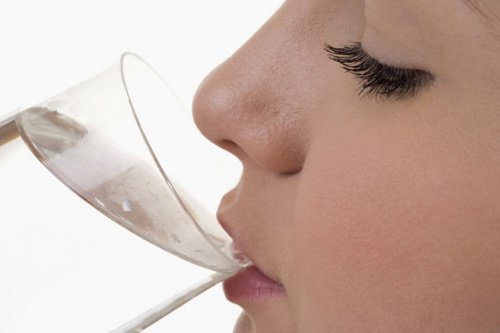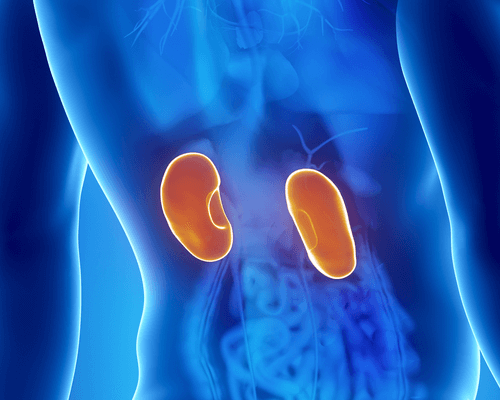The Consequences of Dehydration

Water is a fundamental liquid for life, your body needs it carry out many of its chemical processes. It’s also vital for the absorption of nutrients and the elimination of toxins, among other things. This is why dehydration can have some major consequences for your health.
In spite of all this, the most people simply don’t drink enough water. As time goes on, this can cause many difficult health problems.
It’s true that the body has the ability to cleanse itself. The lack of water can complicate this task and lead to a build-up of toxins. Some of the consequences of dehydration include an increase an inflammation, a higher risk of chronic illness, and a series of symptoms that could impact your quality of life.
The general recommendation is to drink at least 2 quarts of water a day. This includes natural fruit juice, fruits and soups, etc.
Consuming less water than that can cause dehydration, along with a series of reactions that have internal and external consequences.
We know that a lot of people aren’t aware of the effects, which is why we want to talk more about them today. Keep reading!
The consequences of dehydration
Digestive problems

Difficulties in the gastrointestinal tracts are one of the earliest consequences of dehydration. Ninety eight percent of the mucous lining of the stomach is composed of water. So, when your body doesn’t have enough water, your stomach acid can start to damage the lining and cause indigestion, constipation, and heartburn.
Read more:
Joint pain
It is estimated that 80% of the cartilage that protects the joints is water. So, if you don’t drink the necessary amount of water, it can directly affect your joints.
A person who is dehydrated has a 60% higher chance of suffering from arthritis and other inflammatory conditions.
Dehydration can also affect the discs of the spinal column, and lead to a condition known as a herniated disc.
Dryness of the mouth and skin

When it comes to aesthetics, dehydration is a highly visible condition. The delicate layer of skin covering your lips gets dry. When they lack that vital moisture, they can actually split, which definitely doesn’t look nice.
At the same time the skin changes its normal production of oils and as a consequence the lips will look opaque and dry.
Even though there are products that can help moisturize your lips, it’s important to hydrate from the inside if you want to prevent dryness.
Low energy level
The body’s blood plasma is 90% water. With low levels of this liquid the heart has problems pumping the blood and spreading oxygen to each cell of the body.
As a result, energy levels go down and you have trouble achieving a positive physical and mental state.
Kidney problems

Given that the kidneys are the organs in charge of filtering waste and producing urine, they’re a very important part of your health, and they depend a lot on water.
Individuals who become dehydrated have high levels of toxins in their blood. They also tend to suffer from fluid retention and bloating.
On top of all that, dehydration increases the risk of infection in the urinary tract and also the risk of kidney stones.
Circulatory problems
Your circulation slows down if there’s a lack of water in the system. After a few days, blood can build up and cause varicose veins.
Controlling this condition is very important because, after a while, it can increase the risk of high blood pressure, heart attack, and stroke.
You might like:
Decreased muscle mass
Muscles need water to adequately absorb nutrients and stay strong. A dehydrated body can lose a significant amount of muscle mass. It can also cause muscles become flabby and potentially even cause damage to them.
If you do high impact training, it’s vital to increase your daily liquid intake of liquids. This will help your body maintain adequate levels of electrolytes, make up for the loss of liquids, and prevent bloating.
Depression
Low water intake directly affects emotional health. A shortage of liquid in brain tissue increases cortisol levels, which also elevates stress. This can result in serious episodes of depression.
Hunger

Throughout the day, you feel the need to visit the refrigerator continually and choose foods that contain liquid.
But the problem is when these foods digest slowly, which can cause significant weight gain. A lack of water does just that: foods digest slowly, and your body starts to put on pounds.
So, do you need to increase your water intake? Reflect on these symptoms, and how much you drink every day, and keep yourself from ever being dehydrated!
All cited sources were thoroughly reviewed by our team to ensure their quality, reliability, currency, and validity. The bibliography of this article was considered reliable and of academic or scientific accuracy.
- Cheuvront, S. N., & Kenefick, R. W. (2014). Dehydration: Physiology, assessment, and performance effects. Comprehensive Physiology. https://doi.org/10.1002/cphy.c130017
- Grandjean, A. C., & Grandjean, N. R. (2007). Dehydration and Cognitive Performance. Journal of the American College of Nutrition. https://doi.org/10.1080/07315724.2007.10719657
- Sawka, M. N., & Noakes, T. D. (2007). Does dehydration impair exercise performance? Medicine and Science in Sports and Exercise. https://doi.org/10.1249/mss.0b013e318124a664
- Thomas, D. R., Cote, T. R., Lawhorne, L., Levenson, S. A., Rubenstein, L. Z., Smith, D. A., … Morley, J. E. (2008). Understanding Clinical Dehydration and Its Treatment. Journal of the American Medical Directors Association. https://doi.org/10.1016/j.jamda.2008.03.006
This text is provided for informational purposes only and does not replace consultation with a professional. If in doubt, consult your specialist.








